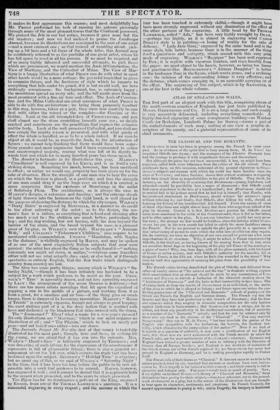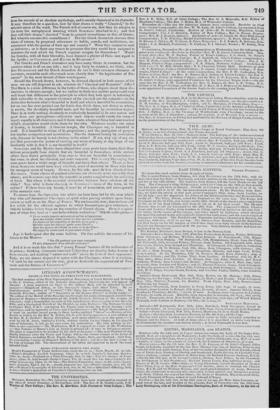THE CLASSICAL AND THE ROMANTIC.
A REVOLUTION ill taste has been in progress among the French for some years past. As an evidence of the spirit that is busy among them, M. de Vier has translated Othello into rhyme ; and the managers of the Theatre Francais have had the courage to produce it with magnificent dresses and decorations.
But although the piece has not been unsuccessful, it has, as might have been expected, called forth seine bitterness from the critics of the old school. These gentlemen have, on this occasion, reiterated all the general objections to SHAKE- PEA It E'S subjects and manner with which the world has been familiar since the
days of ; and have, besides, shown their critical acuteness in exposing what have struck them as improbabilities in the plot of Othello. They dwell, for instance, on the absurdity of assuming that Dm/enema—young, high-born, well educated—could by possibility love a negro of threescore ; that Othello could find cause of jealousy in the loss of a handkerchief ; that Desdrmona should tail to remind him in his jealous mood that he had lost it himself; that Emilia, with her professed attachment to Desdemona, should witness her mistress's agony without relieving it ; and finally, that Othello, after killing his wife, should, on learning the history of the handkerchief, kill himself. From the nature of some of these objections one might almost fancy that those who urge them talked of the play by hearsay. Certain it is that Desdemona's passion for Othello cannot seem more unnatural to the critic of the Constitutionnet, than it did to her father, and to other agents in the play. It is not our intention to justify her very pecu- liar taste ; the attempt we fear would be fruitless, since the defence which SOAKS. PEARE has put in her own mouth has failed to satisfy the more fastidious among the French. Noe do we pretend to uphold the plot generally as a specimen of that subserviency of means to ends which the strict laws of criticism may require. On the contrary, we have no objection of our own accord to point out a few more imperfections in its structure. Why, it might be asked, is Cassio represented by Othello, in the third act, as having known of his wooing from first to last, when we ourselves heard Iago in the beginning of the play tell Cassio of the marriage as a piece of news? Why, too, does logo, with all his plans matured, with his hatred of Cassio as active as ever, and with Othello's authority for the murder, fail to despatch Cassio, in the fifth act, when he finds him wounded in the street? Why does lie omit that opportunity of securing his plans from the possibility of frus- tration.
The French critics having demolished the plot of Othello, and delivered them- selves of sundry sneers at " the natural and the true" in dramatic writing, express their astonishment that an attempt should be made by any countryman of Con- NEILLE and Racist:, to elevate a barbarian of the sixteenth century above the " legitimates of Parnassus" and the heirs to their immortality in later times. This of course leads us from the merits of SHAKSPEARE as an individual, to the merits of the class to which he is alleged to belong; and forces upon our notice the con- flicting pretensions of the "Classical and Romantic" schools of poetry—of the Greek and French, the English and German drama. The French say that the Greeks and they have lent perfection to this branch of literature; that the form and agencies which they employ in dramatic composition are the only barriers against barberism in these matters ; that SuaKseaaaa was a savage, not by ac- cident, not front any peculiarity in his intellectual constitution, but of necessity as a member of the " Romantic " school ; and that-he can be admired only by those who are dead to the charms of the " Classical." " You may translate SIIA KS PEARE," they say to M. do Vaticv, " but how translate the genius of the English who sympathize with the barbarism, the horrors, the insolent bru- tality, which characterize the composition of this author ?" Now if we look at it merely as a question of authority, it may seem a justification of the English taste, that those who are most conversant with the Greek models to which the French refer, are the most enthusiastic of S:LAL:SPEARE'S admirers. Germany and England have trained a greater number of men to intimacy with the literature of Greece than all Europe besides ; and England is riot destitute of hnitations of the Greek drama, nor of the French copies of it ; yet SILIKSPEARE has never lost ground in England or Germany, and he is making proselytes rapidly in France itself.
The French talk of their drama as " Classical." It does not seem to us to be in its nature poetical, tried by oar standard that ancients or moderns have ever had re- course to. Their tragedy is far inferior to their comedy ; and their comedy is rich in character and dialogue only. FIELDING'S novels have as much of poetry. Now, if we rightly understand Scituate:f.'s theory of " Classical and Romantic," these distinctions have poetry for their subject,—they have reference, not to the ground- work of character in a play, but to the nature of the illustrations that are brought to bear upon its characters, sentiments, and situations. In French Comedy, the
nearest approximation to poetry is wit; and in Tragedy, the imagery is borrowed
from the records of an obsolete mythology, and is merely rhetorical in its character. It may therefore be a question, how far their drama is really " Classical," in the strictest sense of the word. The French will of course say, that they do dot give to the term the metaphysical meaning which SCHLEGEL attached to it ; and that they call their drama" classical " front its general resemblance to that of Greece. But wherein consists this resemblance ? Did the Greek dramatists obscure their views of nature, by perpetual references to habits, creeds, and institutions, un- connected with the genius of their age and country ? Were they content to rank as imitators ; or is there any reason to presume that they would have assigned to imitators the rank which the French copyists arrogate for themselves ? Would the Greeks, with all their liberality, have deemed a plaster of Paris cast equal to the Apollo; or CORNE/LLE, and RACINE to EumrioEs The Greeks and French dramatists may have many things in common, but the creative talent is all on one side ; and it may fairly be doubted, we think, whe- ther SHAKSPEARE and the Greek dramatists do not in their common character of inventors, resemble each other much more closely than ra the legitimates of Par- nassus" do the most fervent of their worshippers.
Should the French drama, however, be deemed classical in both senses of the term, we are still disposed to ask, wherein do " Classical and Romantic" differ? That there is a wide difference in the tastes of those, who dispute about these dis- tinctions, is obvious enough ; but we incline to think that neither party could very well trace that difference to the principle to which they both agree in referring it. Both subscribe to the separate existence of the classical and the romantic-to the distinction between what is beautiful in itself,and what is beautiful by association ; but no one has ever pointed out the limits that divide these, nor shown us where, in nature, the absolutely beautiful ends, and the beautiful by association begins. There is in truth nothing absolutely or exclusively beautiful in its own nature and apart from our perceptions-otherwise such objects would excite the sense of beauty equally in all observers; and if there were, whenever these had once excited delight, association would claim them for her Own. Whatever excites our sense of beauty, is beautiful. A Grecian temple, the Classiques say, is beautiful in itself. It is beautiful in virtue of its proportions ; and the perception of propor- tion implies comparison and association. Has the diamond beauty by association only, because its beauty is not obvious in the mine? If not, why say of any ob- ject that possesses the power of exciting our sense of beauty at any stage of our familiarity with it, that it is not beautiful in itself?
SCHLEGEL and the 'Mystics have alleged that some poets have drawn their illus- trations principally from obiects that are beautiful in themselves, while certain others have drawn principally from objects that are beautiful by association- that some, in short, are classical, and some romantic. This is very like saying that some poets have a wider range of thought and fancy than others. Those at least whom SCHLEGEL would term least classical, must of necessity be those who have the strongest sense of beauty. Hosts' s, by this rule. must be less classical than /Escitxtus. Some classes of poetical relations are obviously more recondite than others; and SCHLEGEL says that the romantic in poetry comprehends the usfolding of these. But where is the essential distinction ',deceit these relations all the while ? Nay, what is there classical, in Sciasees.'s sense of the term, in the unities ? If these have any beauty, it must be of association, and consequently of the romantic cast.
To return from the digression into which we have been led by the tone which they who call themselves (.lassiques adepted when passing sentence upon SHAE- SPEARE as well as on the Neer s/' Venice. We are bouncbto state, that we have ;till less relish for the affected raptures to which R.ornantiques give utterance, as Othello hobbles before them on the crutches of French rhyme. Here is a speci- men of what they laud as " one belle et fidele traductiun." Othello soliloquizes- Je ne serail jamais mlcontent Won m'apprenne Que ma femme aims sneer cc que son age entraine: La dense et les concerts, to monde et sa gaito 5 Qu'elle aline les bijoux' parte avec liberta lane (les graces du chant sa voix et le m 0-4e- On regne la vertu tout et per autor (Pelle."
logo is burlesqued after the same fashion. He thus unfolds the causes of his
hatred to the Moor-
" On lit partont clue sans sernpule m'a stigmatise; d'un affront ridicule."
And it is on trash like this that " young France" bestows all the tediousness of its praise ; thinking, (romantic innocents !) that they are thereby doing honour to SHAESPEARE, and exalting "nature alai truth" above the idols of their opponents. Truly, we are almost disposed to agree with the Classiqucs, when they exclaim, "if such be the natural and the true, give us forthwith the supernatural of Vol.- TAIRE and the fictions of COENEILLE."



















 Previous page
Previous page